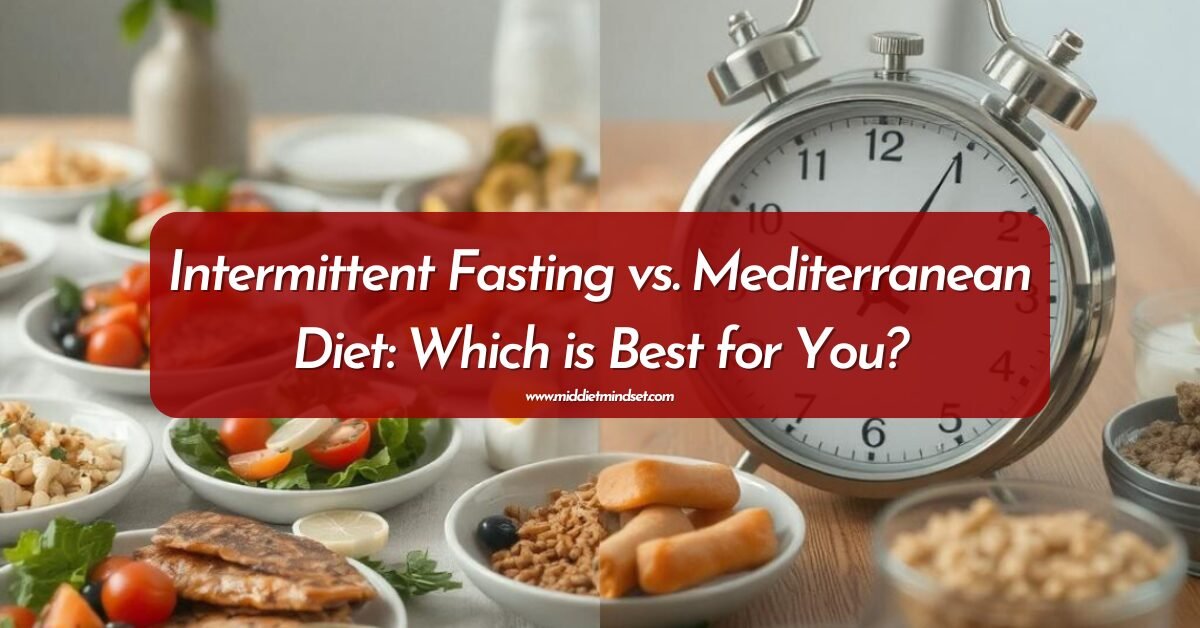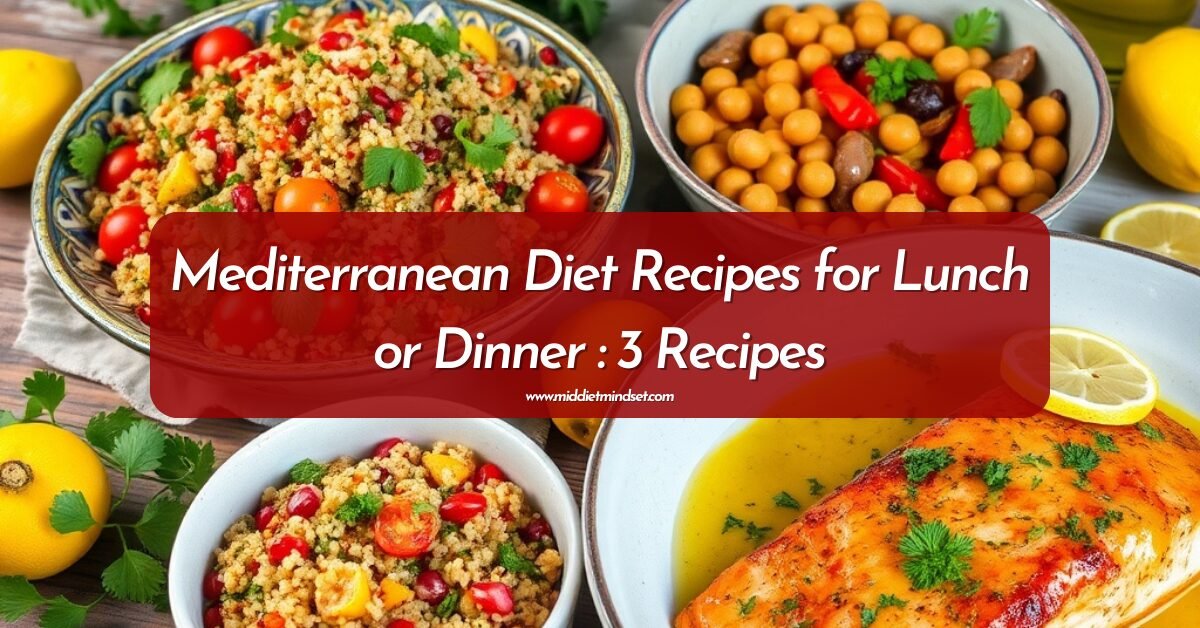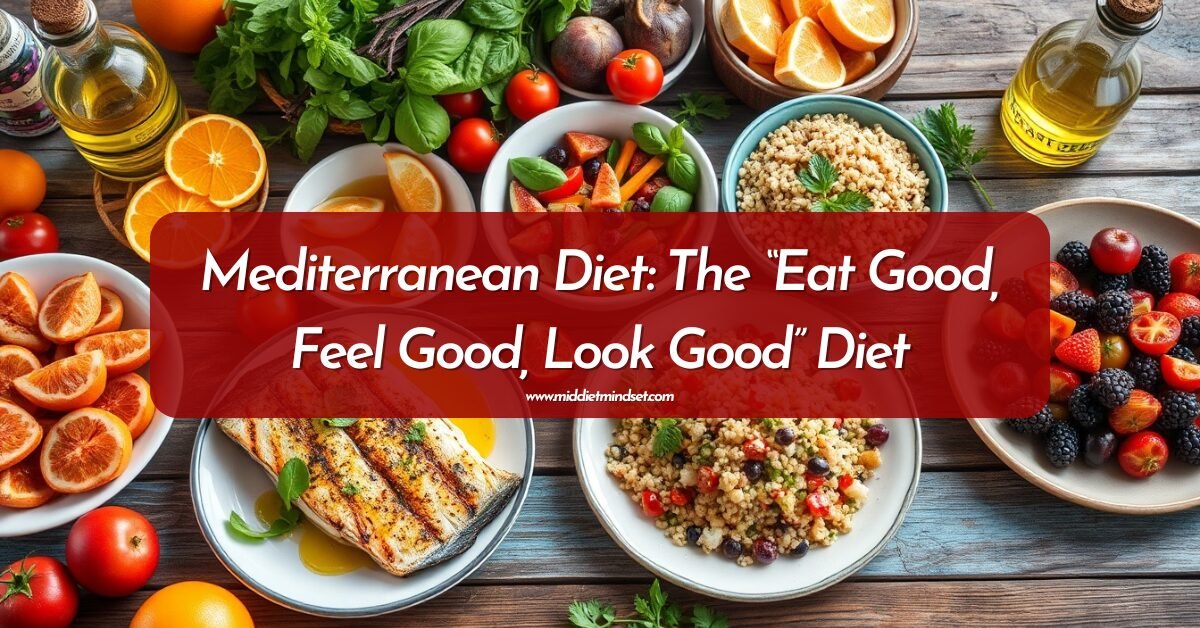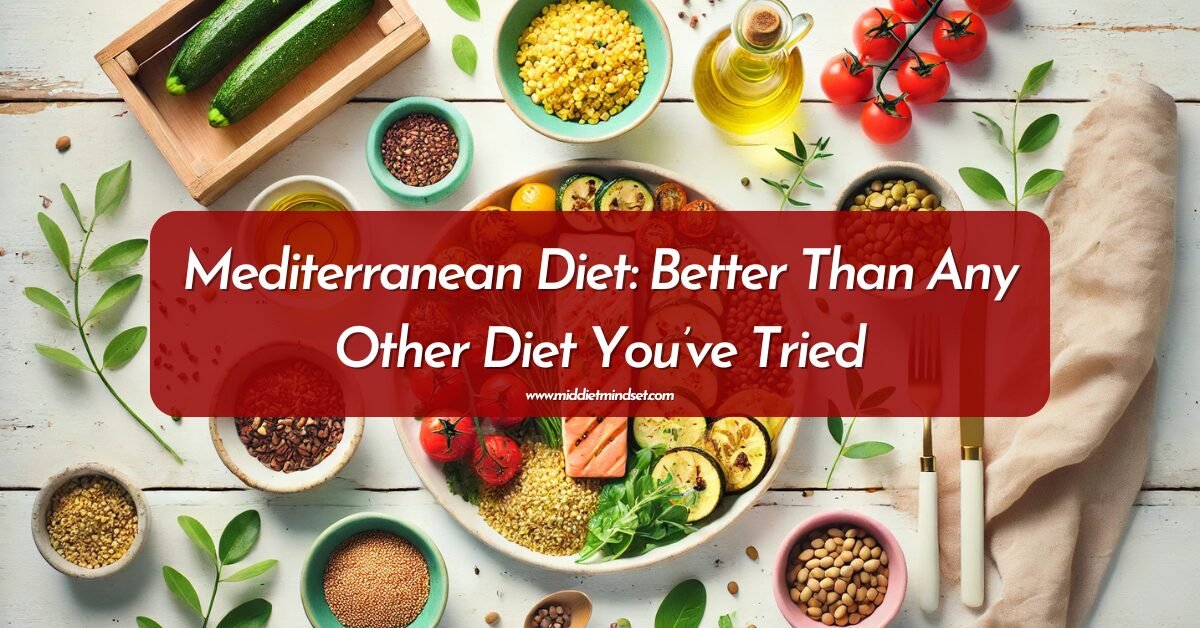Table of Contents
ToggleIf you’ve been searching for sustainable weight loss methods, chances are you’ve come across intermittent fasting vs. Mediterranean diet debates. At first glance, these approaches seem like polar opposites: one focuses on when you eat, while the other emphasizes what you eat. But what if I told you that combining the two could be the ultimate solution for a healthy, balanced lifestyle? In this article, we’ll explore intermittent fasting vs. Mediterranean diet strategies, explain how they differ, and show you why pairing them might just be the key to achieving your weight loss and wellness goals.
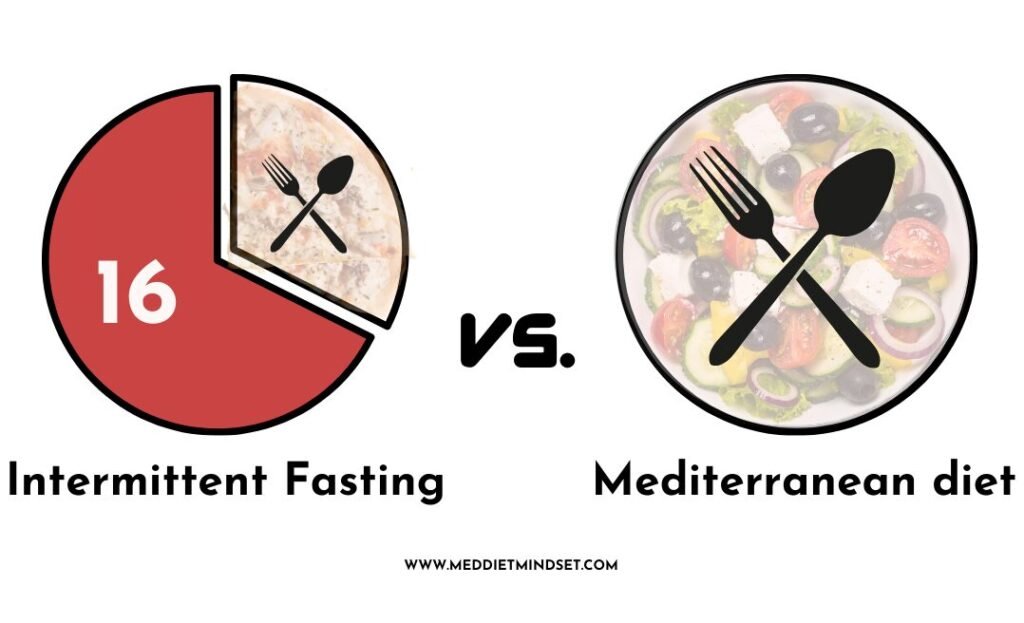
What Is Intermittent Fasting?
The Basics of Intermittent Fasting
Intermittent fasting (IF) is all about meal timing. Rather than dictating what you should eat, it structures your day into periods of eating and fasting. Popular methods include:
- 16:8 Method: Fasting for 16 hours and eating during an 8-hour window.
- 5:2 Diet: Eating normally for five days and significantly reducing calorie intake for two days.
- Alternate-Day Fasting: Alternating between days of eating freely and days of calorie restriction.
For many, IF offers a sense of freedom because there’s no need to obsess over calorie counts or meal prep. Instead, you focus on timing your meals.
Why It Works for Weight Loss
IF helps create a natural calorie deficit, which is a cornerstone of weight loss. By limiting the hours you eat, you’re less likely to snack mindlessly or overeat. Additionally, fasting periods can improve insulin sensitivity and support fat-burning processes.
However, here’s the catch: IF doesn’t tell you what to eat. This is where things can go off track. If you’re filling your eating window with processed snacks, sugary drinks, and fast food, you may not see the health benefits you’re hoping for.
What Is the Mediterranean Diet?
A Lifestyle of Healthy Eating
The Mediterranean diet (MedDiet) isn’t just a “diet” in the conventional sense—it’s a way of life rooted in the eating habits of countries bordering the Mediterranean Sea. It’s centered around whole, nutrient-dense foods, including:
- Fresh vegetables and fruits
- Whole grains like quinoa, farro, and barley
- Lean proteins such as fish and legumes
- Healthy fats, especially olive oil and nuts
Another hallmark of the MedDiet is the focus on mindful eating, social connections, and savoring meals.
To know more about Mediterranean diet, don’t miss our article: Mediterranean Lifestyle: Key to Successful, Lasting Weight Loss!
Why It’s a Weight Loss Powerhouse
The Mediterranean diet naturally supports weight loss by prioritizing filling, fiber-rich foods and healthy fats. These foods help regulate hunger hormones, making it easier to eat in moderation. Plus, the MedDiet is incredibly versatile—you don’t need to count calories or give up your favorite meals. It’s all about balance.

As a registered dietitian, I often guide clients toward the Mediterranean diet because it’s sustainable and enjoyable. One client of mine, Sarah, came to me frustrated after trying restrictive diets that left her constantly hungry. We introduced her to the Mediterranean way of eating, focusing on hearty salads, grilled fish, and the occasional indulgence like dark chocolate. Within weeks, she not only lost weight but also felt more energized and satisfied.
Intermittent Fasting vs. The Mediterranean Diet: What are the Differences
Focus Areas
The biggest difference between these two approaches lies in their focus:
- Intermittent Fasting: Concentrates on when to eat, ignoring the quality of food.
- Mediterranean Diet: Focuses on what to eat, emphasizing whole, nutrient-rich options.
While IF provides structure, it lacks guidance on making healthy food choices. On the flip side, the MedDiet offers a foundation of balanced eating but doesn’t dictate meal timing.
Flexibility
- IF offers flexibility in food choices but requires strict adherence to fasting and eating windows.
- MedDiet allows you to eat freely throughout the day as long as you prioritize healthy foods.
Sustainability
For long-term success, sustainability is crucial. While the Mediterranean diet is widely regarded as one of the easiest and healthiest eating patterns to maintain, intermittent fasting can feel restrictive or challenging for those with unpredictable schedules.
Health Outcomes
- Intermittent Fasting: Improves metabolic health and supports fat loss but may lead to nutrient deficiencies if paired with unhealthy eating.
- Mediterranean Diet: Offers broader health benefits, from heart health to reduced inflammation, and ensures nutritional adequacy.
Why Combining intermittent fasting and Mediterranean diet Works Best
The Perfect Pairing
When you combine intermittent fasting & Mediterranean diet, you get the best of both worlds:
- IF: Provides structure by limiting eating windows.
- MedDiet: Ensures that what you eat during those windows is nutrient-dense and balanced.
For example, during your eating window, you might enjoy a Mediterranean-inspired meal like quinoa tabbouleh with grilled salmon and a drizzle of olive oil. This pairing not only supports weight loss but also promotes overall health.
I tried pairing IF with MedDiet during a particularly hectic time in my life. I followed the 16:8 method, breaking my fast with a colorful Mediterranean salad and ending my eating window with a hearty vegetable stew. Not only did I feel more in control of my eating habits, but I also noticed better energy levels and improved digestion.

Practical Tips for Combining IF and MedDiet
- Choose an IF Schedule That Fits: Start with a moderate fasting window, like 12:12, and adjust as needed.
- Focus on Mediterranean Staples: During eating windows, fill your plate with vegetables, lean proteins, and healthy fats.
- Stay Hydrated: During fasting periods, drink plenty of water, herbal tea, or black coffee.
- Plan Ahead: Prep Mediterranean meals in advance to make your eating window stress-free.
Sample Routine: Combining IF and MedDiet
Here’s how a day might look:
- Morning (Fasting Period): Hydrate with water, green tea, or black coffee.
- 12:00 PM (Breaking the Fast): A Mediterranean bowl with quinoa, roasted vegetables, chickpeas, and tahini.
- Snack (Mid-Afternoon): Greek yogurt with a handful of walnuts and fresh berries.
- 7:30 PM (Final Meal): Grilled chicken, a side of whole-grain farro, and a fresh spinach salad with olive oil and lemon dressing.
Who Should Try This Combination?
Combining intermittent fasting & Mediterranean diet is ideal if you:
- Want the structure of fasting but need guidance on healthy eating.
- Struggle with portion control and want to feel fuller for longer.
- Aim for sustainable weight loss that prioritizes health over quick fixes.
Conclusion
When it comes to intermittent fasting vs. Mediterranean diet, you don’t have to choose one or the other. By blending these approaches, you can enjoy the structure of fasting alongside the balanced nutrition of the Mediterranean lifestyle. This combination not only supports weight loss but also fosters long-term health and happiness.
So, if you’re ready to take the next step, why not try pairing IF with the MedDiet? Start small, experiment with what works for you, and remember: the best diet is the one you can stick with for life.
F.A.Q.
Yes, combining intermittent fasting and the Mediterranean diet is not only possible but highly beneficial for weight loss and overall health. Here’s why this pairing works:
- Balanced Nutrition: The Mediterranean diet ensures you get all essential nutrients by focusing on whole foods like vegetables, lean proteins, and healthy fats.
- Fasting Structure: Intermittent fasting provides a clear eating schedule, helping to control calorie intake and promote fat burning.
Tips for Combining:
- Break your fast with a Mediterranean-inspired meal, such as a salad with olive oil, grilled fish, and whole grains.
- During your eating window, focus on nutrient-dense options like fresh produce, nuts, and legumes.
- Avoid processed foods, even during fasting breaks, to maximize health benefits.
By combining these approaches, you can enjoy the structure of intermittent fasting alongside the health benefits of the Mediterranean diet, creating a sustainable and effective lifestyle.
The best intermittent fasting method to pair with the Mediterranean diet depends on your lifestyle and goals. Here are three popular methods to consider:
- 16:8 Method: This is the most compatible with the Mediterranean diet. You fast for 16 hours and eat during an 8-hour window, allowing you to enjoy two balanced Mediterranean meals and a snack.
- 12:12 Method: Ideal for beginners, this method involves fasting for 12 hours and eating within a 12-hour window, offering flexibility to include all Mediterranean staples.
- 5:2 Method: Eat normally for five days a week (Mediterranean-style) and limit calorie intake to about 500-600 on two non-consecutive days.
Each method allows you to enjoy the Mediterranean lifestyle while benefiting from the structure of fasting. Choose the one that feels most sustainable for you and adjust as needed.
Combining intermittent fasting and the Mediterranean diet offers several science-backed benefits that support both weight loss and long-term health:
- Improved Weight Management: Intermittent fasting helps regulate calorie intake, while the Mediterranean diet’s focus on whole foods ensures meals are satisfying and nutrient-rich.
- Heart Health: The Mediterranean diet’s emphasis on healthy fats like olive oil and fatty fish, paired with the metabolic benefits of fasting, improves cardiovascular health.
- Reduced Inflammation: Both approaches reduce inflammation. Fasting promotes cellular repair, while Mediterranean foods like nuts and vegetables have anti-inflammatory properties.
- Enhanced Energy and Focus: By breaking your fast with Mediterranean staples like whole grains and lean proteins, you avoid energy crashes and stay focused throughout the day.
This combination leverages the strengths of intermittent fasting vs. Mediterranean diet, providing a lifestyle that is both effective and sustainable for long-term well-being.

Nour is a registered dietitian, nutrition researcher, and founder of MedDietMindset. With a passion for evidence-based nutrition, she specializes in Mediterranean diet strategies, PCOS management, and sustainable weight loss. Nour is dedicated to transforming complex scientific research into clear, actionable guidance to support healthier, long-lasting lifestyle changes. Through her blog, she empowers readers to build habits that prioritize well-being, balance, and vitality.
